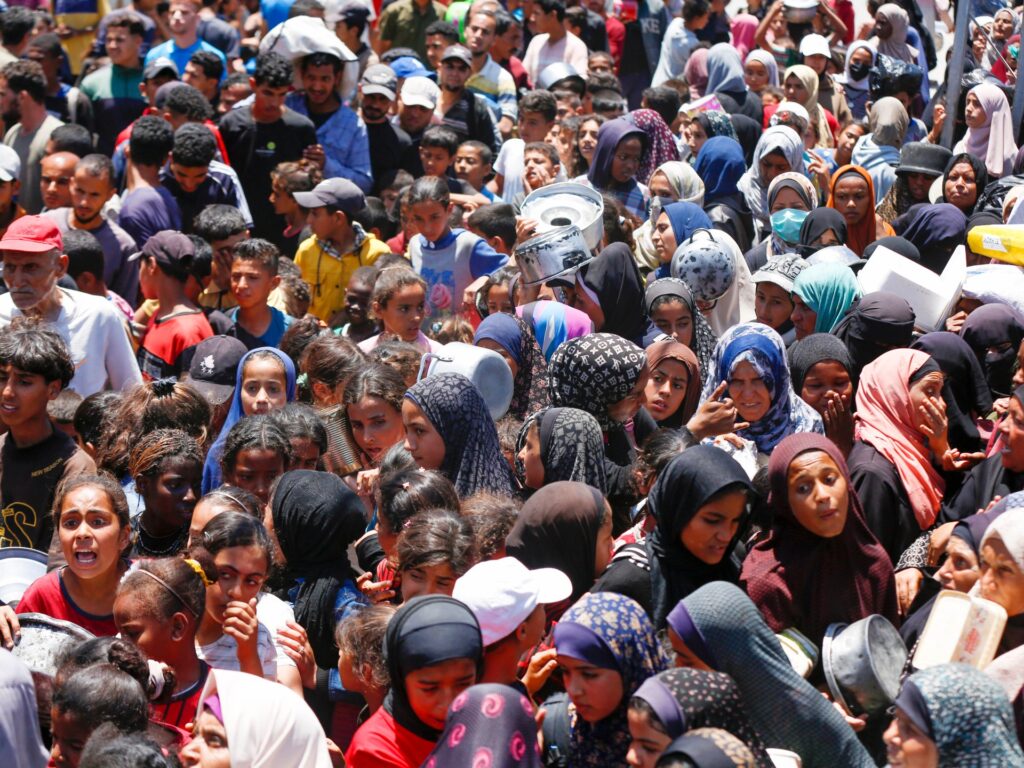Gaza is the “hungriest place on Earth”, the United Nations has said, as Israel continues to block all but a trickle of humanitarian aid from entering the Strip, where famine stalks the entire Palestinian population, and the Israeli military relentlessly bombs the besieged enclave.
Jens Laerke, spokesperson for the UN Office for the Coordination of Humanitarian Affairs (OCHA), said on Friday that 100 percent of the 2.3-million population of Gaza is now on the verge of “catastrophic hunger”.
The “limited number of truckloads coming in [Gaza] is a trickle – it’s drip-feeding food,” Laerk said.
“The aid operation that we have ready to roll is being put in an operational straitjacket that makes it one of the most obstructed aid operations not only in the world today, but in recent history”, he added.
What paucity of aid is entering the enclave is under the control of a new, shadowy NGO backed by Israel and the United States – the Gaza Humanitarian Foundation (GHF).
On Friday, sources at Gaza hospitals told Al Jazeera that 20 people were shot by Israeli troops as they desperately tried to get food at a GHF aid distribution point.
That distribution site, located near Israel’s Netzarim Corridor bisecting the territory, is the third to have been set up, after two distribution points were established in the southern city of Rafah.
Armed surveillance is administered around the clock. “People are telling us that the sites managed and operated by the GHF are metres away from where the Israeli military is stationed. They can see the tanks, they can see the armoured vehicles,” said Al Jazeera’s Hani Mahmoud, reporting from Gaza City.
Ten people were killed earlier this week trying to access food distribution points, and images showed many being herded into cage-like lines. Palestinians doing all they can to get hold of any aid for their families must risk Israeli fire and military forces.
“There are also reports of enforced disappearances. A lot of families reported that many of their children, of their family members, who went to the sites … have gone missing as they were trying to get food,” Mahmoud said.
The aid delivery scheme has been roundly condemned by UN officials and the humanitarian community, who have accused the group of aiding Israel’s war objectives by forcibly displacing Palestinians under the guise of aid.
Critics maintain that the currently inadequate aid could be safely scaled up in Gaza, if Israel would allow access to aid and let the organisations that have decades of experience handle the flow.
“Through this dangerous and reckless approach, food is not being distributed where it’s needed most but is instead directed only to areas where Israeli forces choose to amass civilians,” said Doctors Without Borders Secretary-General Christopher Lockyear. “This means the most vulnerable – especially the elderly and people with disabilities – have virtually no chance of accessing the food they desperately need.”
Famine is declared in an area where at least 20 percent of households face an extreme lack of food. At famine levels of deprivation, 30 percent of children suffer from acute malnutrition, and at least four children in every 10,000 die each day from starvation or malnutrition-linked disease. OCHA said at least 1 in 5 people in Gaza is currently facing starvation.
Michael Fakhri, the UN special rapporteur on the right to food, says it’s “safe to say there is famine” in Gaza. Fakhri told Al Jazeera that Israel is using aid “as bait to corral people” and push them out of the north and into militarised zones”.
The humanitarian situation in Gaza was already catastrophic when Israel imposed a total blockade on March 2, causing conditions to deteriorate even further. After growing international pressure, Israeli authorities said they would allow minimal supplies of food and medicine into the Strip, but critical supplies are still not reaching the people.
France’s sanctions threat
The chorus of condemnation against Israel was underscored by France’s President Emmanuel Macron on Friday. The French leader warned that Paris could “apply sanctions” unless the Israeli government responds to the humanitarian crisis in Gaza.
Speaking during a visit to Singapore on Friday, Macron said the international community could not remain passive while Palestinians in Gaza face a deepening hunger crisis that is “untenable”.
“If there is no response in the coming hours and days in line with the humanitarian situation, we will have to harden our collective position,” he added, suggesting that France may consider applying sanctions against Israeli settlers.
Palestinian daily deaths as ceasefire remains uncertain
At least 30 people have been killed since dawn on Friday in attacks in southern Deir el-Balah, northern Jabalia and on eastern Khan Younis.
The Israeli army has also been expanding its military operation on the ground, issuing new forced displacement orders for five areas in northern Gaza. According to a UN spokesperson, nearly 200,000 people have been displaced in Gaza in the last two weeks by Israel’s displacement orders.
Meanwhile, hopes for an elusive truce remained unrealised. Hamas said on Friday it is currently reviewing a new US ceasefire proposal that Washington says has been signed off on by Israel, but that in its current form will only result in “the continuation of killing and famine” in Gaza.
White House press secretary Karoline Leavitt said on Thursday that Israel had “signed off” on the ceasefire proposal, and the Trump administration’s Middle East envoy, Steve Witkoff, had submitted it to Hamas for consideration.
Trump said he believes his administration will have an announcement later on Friday, “or maybe tomorrow”.
“We have a chance of that,” he told reporters from the Oval Office.
The details of the new proposal have not been made public, but senior Hamas official Sami Abu Zuhri told the news agency Reuters that, crucially, it did not contain commitments from Israel to end its war on Gaza, withdraw from the enclave, or allow aid to freely enter the war-torn territory.



